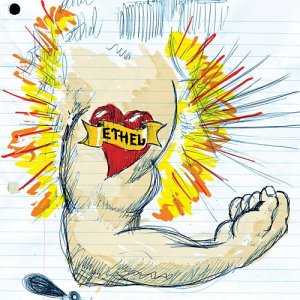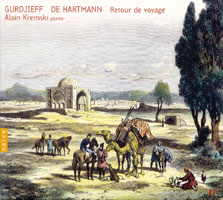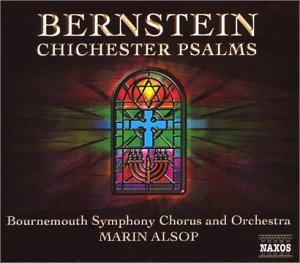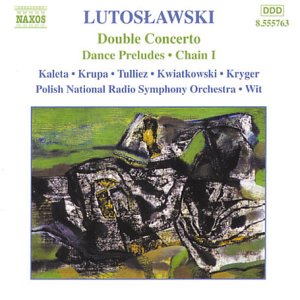

 |
 |
|
 |
|
| About Us |
|
Read Past Issues | Resources | Composer Links |
Different Trains was originally scored for string quartet and performed by the Kronos Quartet in 1988. The idea for the piece originates from Reich's childhood, several wartime years spent traveling with his governess between his estranged parents, his mother in Los Angeles and his father in New York. Exciting, romantic trips, full of adventure for the young Reich but many years later, it dawned on him that, had he been in Germany during the ethnic cleansing by the Nazis, his Jewish background would have ensured that the trains he would have been riding on would have been very 'different trains.' He set about collecting recordings to effectively recreate and document the atmosphere of his travels to contrast with those of the unfortunate refugees. By combining the sound of train whistles, pistons and the scream of brakes with extracts of speech by porter Lawrence Davis, who took the same rides as Reich between the Big Apple and Los Angeles, governess Virginia and three holocaust survivors (Paul, Rachel and Rachella), Reich creates music of great intensity and feeling. The rhythmic patterns and pitch of the voices establishes the phrases and course of the music heard in the quartet: 'crack train from New York,' and '1939' for example, heard in the invigorating, steam-driven opening movement, America-Before The War. The slow, middle section, Europe-During The War, finds the refugees in the midst of their nightmare, 'no more school' and being herded into the cattle wagons. 'They shaved us, They tatooed a number on our arm, Flames going up to the sky- it was smoking.' Sirens from the Kronos help to convey the despair and confusion of the Jewish plight. Reconciliation is achieved in part three, After The War, where Paul, Rachel and Rachella are transported to live in America. There is an incredibly poignant moment when Paul proclaims '… the war was over,' Rachella, in sheer, fragile disbelief, asks 'Are you sure?.' The New York Times hailed Different Trains as 'a work of… astonishing originality' and the piece was subsequently awarded a Grammy in1989 for Best Contemporary Compostion. The New York Times hailed Different Trains as "a work of such astonishing originality that breakthrough seems the only possible description....possesses an absolutely harrowing emotional impact." Reich says the new version was suggested by conductor David Robertson. In an interview with Frank Oteri, the composer talks about the difficulties of having live musicians perform some of the musical gymnastics involved and sounds, frankly, a little skeptical about whether it can be performed satisfactorily. I’ll be there and will let you know what I think. In addition to Different Trains, the opening concert of the ACO season features the New York premiere of Anna Weesner’s Still Things Move, works by John Adams and Charles Wuorinen, as well as Irving Fine’s rarely performed Serious Song: Lament for String Orchestra and Alan Hovhaness’ haunting The Holy City. The
concert is Wednesday, October 8, 2003 at 8pm at Carnegie Hall.
|
|
An Interview with Tobias Picker Handmaid Tale's Debuts in English Rautavaara Joins B&G Who's Afraid of Julia Wolfe Derek Bermel's Soul Garden The Pianist: The Extraordinary True Story of Wladyslaw Szpilman John Adams' Atomic Opera A Bridge Not Far Enough Turnage Signs With B&H Sophie's Wrong Choice Copland's Mexico On Being Arvo Rzewski Plays Rzewski Praising Lee Hyla David Lang's Passing Measures Three Tales at BAM Naxos at 15 On the Transmigration of Souls Dead Man Walking David Krakauer's The Year After Steve Reich/Alan Pierson
|

Ethel Composers: King, Kline, Reynolds, Ziporen Performers: Ethel Cantaloupe New
York's most daring string-quartet sensation, Ethel, makes its debut here
with a menu of the kind of hard-edged downtown music that has won the group
a big following in the NY new music scene. Todd Reynolds and
Mary Rowell, violins; Ralph Farris, viola; and Dorothy Lawson, cello—all
began their careers in New York as freelance musicians, playing difficult
music that relies heavily on non-classical sources but requires a virtuoso
classical ensemble to play. Its repertoire ranges from John King's energetic
blues transcriptions to the gnarly quartets of Julia Wolfe
and on Todd Reynolds' quirky
|

Return from a Journey Composers: Gurdjieff, De Hartmann, Performer: Kremski Naive Gurdjieff
was a Russian Aremenian spiritual master who, in addition to the main body
of his teaching created sacred dances, or Movements, as well as 200
or so musical compositions--all of which were were done in collaboration
with German composer Thomas de Hartmann at Gurdjieff's Institute
for the Harmonious Development of Man, near Paris, in the years 1925–27.
For many years, the pieces heard here were played only by De Hartmann or
another of Gurdjieff's disciples but in recent years they have attracted
the interest of a number of adventuresome pianists. Kremski plays
these exotic, vaguely oriental and oddly thematic pieces with great respect
and warmth.
|
 Chichester
Psalms
Chichester
Psalms
Composer: Leonard Bernstein Performers: Bournemouth Symphony Orchestra and Chorus, Marin Alsop (conductor) Naxos Commissioned in 1965 by the Dean of Chichester, Bernstein’s colorful Chichester Psalms is one of the composer’s most successful and accessible works on religious texts, contrasting spiritual austerity with impulsive rhythms in a contemplation of peace. The composer fashioned his Oscar nominated score to the 1954 movie On the Waterfront into a symphonic suite, skillfully capturing the oppression of the New York dockyards in the ’50s. The Three Dance Episodes were extracted from the popular On The Town, Bernstein's first successful foray into musical theatre. Bernstein protege Marin Alsop gets a robust performance from Bournemouth orchestra and chorus. |

Double Concerto Composer: Witold Lutoslawski Performers: Polish National Radio Symphony, Antoni Wit Volume 8 in Naxos' indispensible survey of Lutoslawski's orchestra work brings us into lesser known territory but there are still treasures to be found. The Dance Preludes from 1955 is basically a five-movement clarinet concerto, with lots of interesting harmonies and rhythmic twists and turns. The Double Concerto for oboe and harp from 1990 rattles the ear a bit and has a demanding oboe part, beautifully played by Arkadiusz Krupa. The Children's Songs, gorgeously sung by the soprano, Urszula Kryger, are beguiling. |

Doña Francisquita Composer: Amadeo Vives Performers: Maria Bayo, Alfredo Kraus, Orquesta Sinfonica de Tenerife, Antoni Ros Marba Naive A superb performance of Amadeo Vives' zarzuela masterpiece, sung with enormous vivacity and brio by the ravishing-voiced Maria Bayo and the sturdy Alfredo Kraus. With its nineteenth century Madrid setting, its roots in classical Spanish drama and its festive nocturnal amours, Doña Francisquita provides a retrospective on the romantic zarzuela tradition and its crowning glory. The work was immediately recognized not only as Vives’ masterpiece, but as the greatest full length zarzuela of its era. If you're not into zarzuela already, this is the perfect place to start your collection. |

Symphony 9 Visionaria Composer: Kurt Atterberg Satu Vihavainen (mezzo-soprano); Gabriel Suovanen (baritone) NDR Choir, Prague Chamber Choir NDR Radio Philharmonic, Ari Rasilainen CPO The 9th and final symphony of Swedish composer Kurt Atterberg bears a superficial relationshp to Beethoven's 9th with its big, expresssive choral sound but Atterburg's world is a good deal less joyous. Atterberg's choice of texts reflects the lasting impact on his psyche made by World War II and the Korean War. The Poetic Edda, an Icelandic epic dating from around 1270, relates the visions of a wise prophetess (hence the Symphony's title "Sinfonia Visionaria") who foretells the creation of the world, the warring among gods, giants, and humans, the world's destruction, and finally its recreation. Atterberg uses mezzo-soprano and baritone soloists with chorus and large orchestra, as well as a quasi-oratorio form, to tell his epic tale. This is extraordinary symphony by a composer who is far too little-known in the musical world. |

The Complete Mazurkas Composer: Karol Szymanowski Performer: Marc-Andre Hamelin Hyperion Marc-Andre Hamelin continues his extraordinary journey through the forgotten rivers and bayous of the modern piano repetoire with masterful performances of Szymanowski's Twenty Mazurkas, Op. 50, composed between 1926 and 1931. After assimilating the influence of Stravinsky, Szymanowski began looking for folk themes in Polish music to rival the Russian folk touches of the master. The Mazurka, a traditional Polish dance in three-quarter-time with an often erratic-seeming emphasis on the second beat, (and a favorite form for Chopin) offered great possibilities . These highly diverse pieces are more complex than Chopin, more modern and dissonant, yet also more muted and elusive. Still, Szymanowski remained too much a romantic to settle for anything less then flamboyant virtuosity--a quality that Hamelin possses by the truckload. |

Accentus Composers: Transciptions: Bach, Barber, Berg, Chopin, Debussy, Mahler, Ravel, Wolf Peformers: : Choeur De Chambre Accentus, Equilbey Naive Worth having for the ravishing performances of Samuel Barber's "Adagio" and Mahler's "Adagietto from Symphony No. 5." |

Symphony No. 6 Composer: Gustav Mahler Performer: London Symphony Orchestra; Mariss Jansons Label: LSO Live It is rare that you find a recording that you need listen to for only a minute to know a masterpiece is unfolding before your very ears. This stunning live performance of Mahler's "Tragic" symphony is one of the rare ones, From the first rhythmic thumps of the long and stately funeral march to the final faded chords, Mariss Jansons draws a passionate and committed performance from the LSO. Certain to be among the best of the year noninees. |

Wheel of Emptiness Composer: Jonathan Harvey Performers: Actus Cyprès CYP5604 English composer Jonathan Harvey is one of those modernists whose work is more frequently talked about then played. This rare recording contains five representative works ranging from the lyrical to the raw, built on instrumentations ranging from electroacoustical to the traditional. An excellent introduction to an unjustly neglected maverick. |

Piano Etudes 1 Composer: Philip Glass Performer: Philip Glass Orange Mountain Glass says he wrote these "studies" as fodder for his own concert performances and as a way of challenging himself as a pianist. But, they are much more important than that. They provide a real insight into how Glass composes and, although billed as sketches, sometimes are more rewarding to the ear and intellect than many of Glass's larger-scale works. Essential recording for the Glassologist. |

Music from the Thin Blue Line Composer: Philip Glass Orange Mountain Glass's hypnotic score for Errol Morris’ extraordinary 1988 documentary film entitled "The Thin Blue Line".
Nonesuch Records released a CD of the film’s soundtrack that included the narration and interviews from the film but this Orange Mountain release contains the original score without the voice-over. The music is dark and brooding, full of tension appropriately for such a chilling film, and it stands well on its own. |

Sonic Vision Composer: Carolyn Yarnell Tzadik Inspired by the beauty and power of nature, the music of Carolyn Yarnell straddles the borders of minimalism, romanticism and Baroque. Sonic Vision, the first CD devoted entirely to her music, contains the powerful electronic composition Love God, a beautiful solo piece for Baroque flute, a minimalist suite for chamber ensemble and a powerful extended work for computer piano. Lyrical and mystical music that evokes volcanoes, birds and the Rocky Mountains. |

Chamber Music Composer; Harold Shapero Performers: Lydian String Quartet New World Records - Shapero’s (b. 1920) vastly underrated portfolio is one of the great undiscovered treasure troves of American neoclassicism. The String Trio, the String Quartet, the Serenade in D offer a broad-based introduction to Shapero’s compositional thought processes. Beautiful, committed playing by the Lydian String Quartet. |

Drumming Composer: Steve Reich Performer: Ictus, Synergy Vocals Cypres Reich's 1971 masterpiece gets a spirited workout by the Belgian new music group Ictus. Drumming is constructed around one single basic rhythmic-melodic pattern, for an imposing ensemble of percussion (bongos, marimbas, glockenspiel) joined by some female voices, a piccolo flute or a whistling part. The breathtaking feeling of simplicity/complexity in this work is transmitted with an amazing skill by the Belgians. |

American Works for Piano Duo Composer(s): Barber, Persichetti, Diamond, Fennimore Performer (s): Georgia & Louis Mangos Cedille Records Barber's homage to the Plaza Hotel's Palm Court, Souvenirs, Op. 28, has never sounded better or more nostalgic and Joseph Fennimore's Crystal Stairs also invokes the quintessential American city. The real surprise here are the two pieces by Vincent Persichetti, which invoke a more dynamic and rough and tumble form of Americanism. The Mango sisters display formidable technique and taste.
|
 |
Search WWWSearch www.sequenza21.com |
